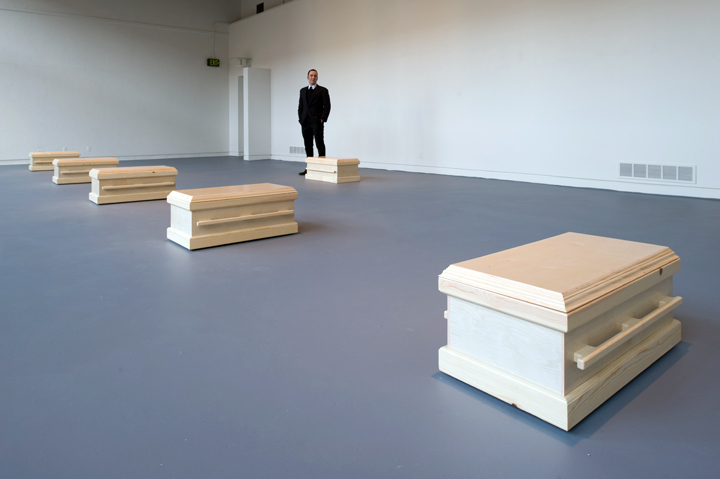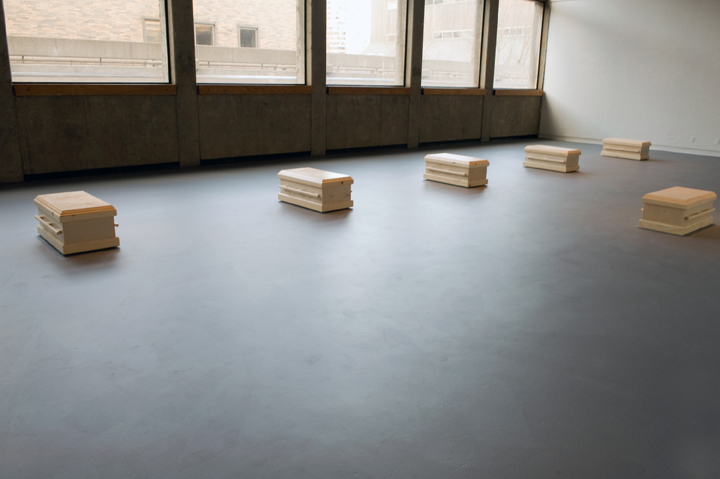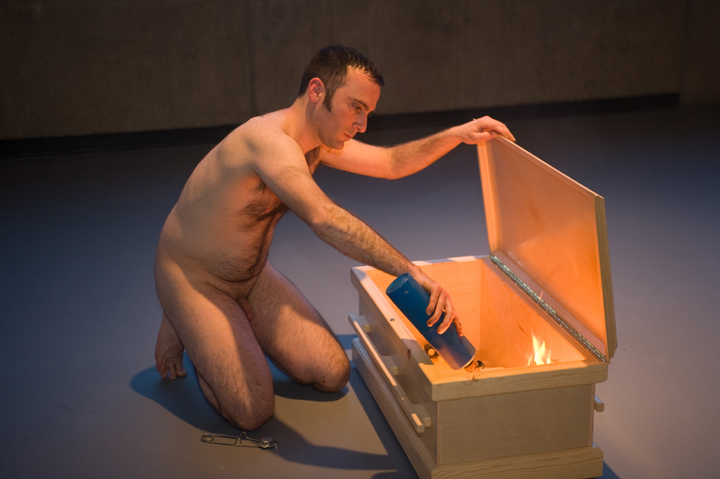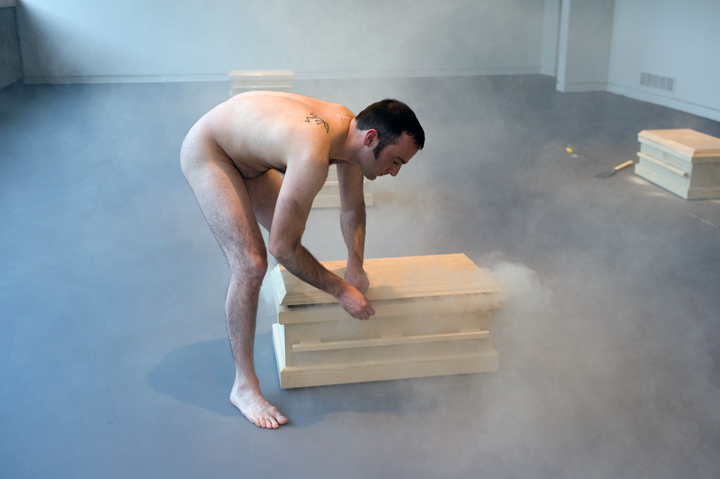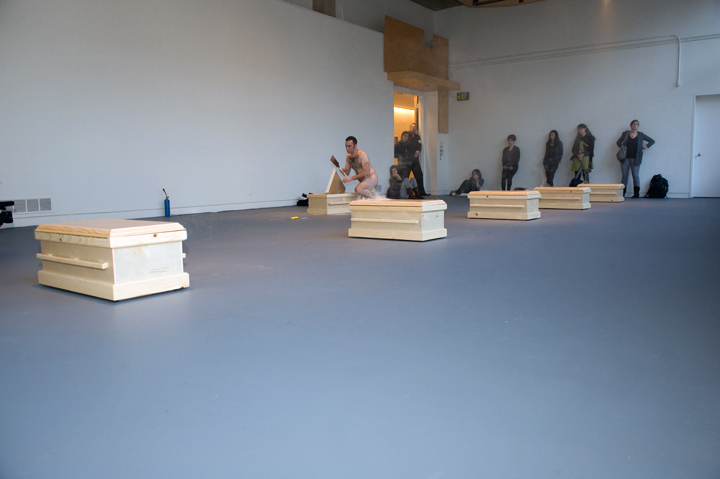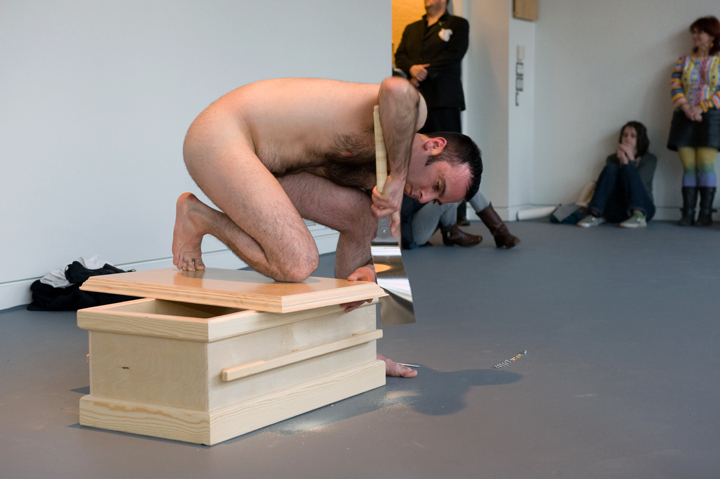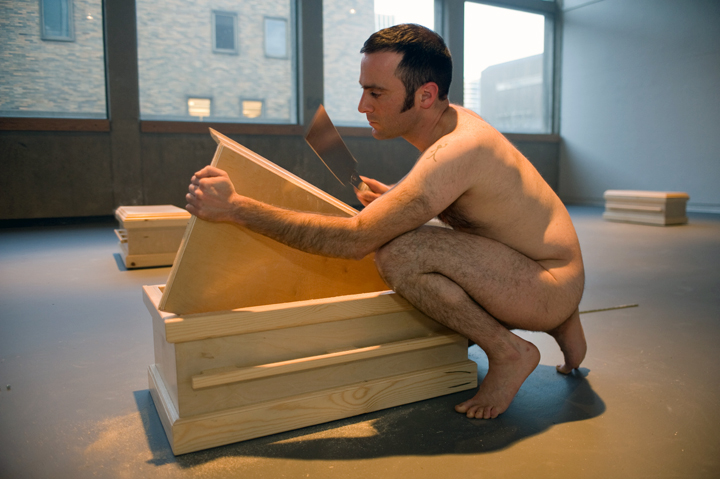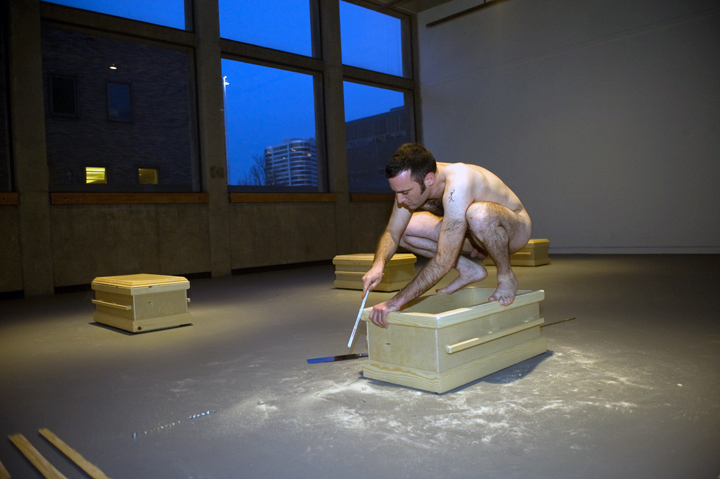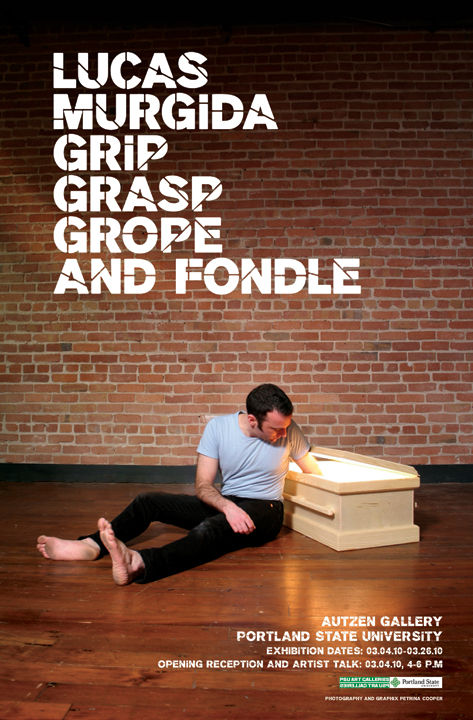Grip, Grasp, Grope and Fondle, Portland, OR, March, 2010
On March 4, 2010 I executed a 3-hour performance in The Autzen Gallery at Portland State University. Inside of the space there were five baby-sized coffins. Each had a metronome in its interior that was quietly ticking. At the start of the performance I used a propane torch to ignite devices that produced a large amount of sage smoke inside of each of the coffins. With the lids closed, the coffins emitted curls of smoke from the cracks at their tops. I then stripped and began to dismantle a sixth coffin with a Japanese saw. At times this process was slow and methodical and at others it was loud and violent. Periodically I would stop sawing and re-light the sage. At the end of the performance the pieces of the dismantled coffin were arranged neatly on the floor of the gallery. I then put my clothes back on and exited the space.
Bellow is the first stage of some new research that spawned this piece:
On April 3rd of 1968 Rev. Martin Luther King, Jr. gave his “I’ve Been to the Mountain Top” speech in Memphis Tennessee. In the speech he outlined an incident in 1955 in which a homeless women stabbed him in the chest while he was autographing books in New York City. The knife had come incredibly close to cutting his aorta, which would have meant certain death. He went on to recount the many things that he had been able to witness because his life had been spared that day. In the speech he said that there had been several recent threats on his life during his stay in Memphis. He continued and said that none of it mattered to him anymore because God had allowed him to go up the mountain and view the Promised Land:
“Like anybody, I would like to live a long life.
Longevity has its place.
But I’m not concerned about that now.
I just want to do God’s will.
And He’s allowed me to go up to the mountain.
And I’ve looked over.
And I’ve seen the Promised Land.
I may not get there with you.
But I want you to know tonight, that we,
as a people will get to the Promised Land!
And so I’m happy tonight.
I’m not worried about anything.
I’m not fearing any man!
Mine eyes have seen the glory of the coming of the Lord!”
www.youtube.com/watch?v=o0FiCxZKuv8
The next day on April 4th of 1968 he was shot and killed while standing on the balcony of his hotel room.
What is the difference between “compulsion” and “duty?” The historical meanings of “compulsion” are rooted in notions of forced coercion or loss of control. In this history actions spawned from compulsion are the result of a person, group, institution, or ideology forcing another person to act in a certain way. “Duty” on the other hand historically has implications of respect. It is an expression of submission out of reverence. It also refers to a debt that one owes to another or a payment due and enforced by law or costume, (O.E.D.) But it also refers to, “Action, or an act, that is due in the way of moral or legal obligation; that which one ought or is bound to do; an obligation.” (O.E.D.) And, an “obligation” refers to a commitment that one is morally or legally bound to. It represents an articulated point of connection. These ideas of debt and payment reminded me of the passage bellow regarding the karma and fatalism:
“Karma does not mean fatalism, but rather, compensation. When a man buys something on credit, he creates a dept, and the law declares that he must pay that debt. In a material, economic transaction this would not be regarded as fatalism, but as responsibility.” Essential Hinduism, p. 175
What strikes me about Dr. Kings speech is the line, “I just want to do God’s will.” Does he feel that God is compelling him to do certain things or does he feel that it’s his duty? How does Dr. King do Gods will in this instance? Is he referring to the marches and protests that are scheduled to occur while he is in Memphis or is he referring to his possible death? In light of above definitions of “duty” what is it that Dr. King owes God?
He said he wasn’t afraid of anything or any man. What was it that made him so fearless? Is it courage? Over the years the word “courage” has been used to described ones personal nature or disposition, ones desires or inclination, liveliness, vigor, confidence, anger, pride, sexual vigor, lust, or bravery. (O.E.D.) We face fear with courage. And in courage we must bring all that we have, including our hopes, desires, strengths, weaknesses, lust, love, and bravery…etc. These are not implored in order to overcome a challenge. Instead they must be used to overcome the fear that arises as a result of the challenge. Fear brings all of our weaknesses to the surface. It challenges our conception of ourselves. Fear holds a distorted mirror to our face. It shades ones self-perception with ideas of doubt and inadequacy. It makes us feel that we are not capable and weak. It convinces us that we cannot possibly do what must be done because we are such “flawed creatures.” Tasks then seem insurmountable and we hide. We then make a decision through indecision because we cannot choose to take action or to run. Fear takes our power to choose away and we freeze. And, that is the true power that fear wields. It freezes us into inaction. In our modern age, after a person freezes, many of will then take refuge in vices and distractions that are all too easy and abundant to partake in.
In the animal kingdom there exists a device called a monkey trap. It looks like a vase that has a wide bottom and a narrow hole at the top and inside there is a banana. The hole at the top is large enough for a monkey to squeeze its hand through but not wide enough for the monkey to get its hand out while clutching the banana. The monkey is faced with a dilemma: 1) to have the object of its desire and remain trapped or 2) To be free but not have the object of its desire.
The tighter the monkey clutches the banana the greater the grip binding its detention becomes. In this case the monkey’s grip is the captor. When the monkey first sticks its hand into the vase it must grope for the banana and, after a few grasps, is able to grab hold of it. After taking a moment to fondle the prize the monkey realizes as the attempt is made to remove the banana that the action of griping will not allow the monkey actually “have” the banana. The very thing that allows the monkey to possess the banana is the thing that will not allow the monkey to have and consume it. “Grip” refers to holding something tightly with hands, mouth, feet, beak, claws…etc. “Grasp” refers to grabbing repeatedly in an attempt to snatch something i.e. “grasping at thin air.” In current usage it also refers to the full mental comprehension of an idea. “Grope” refers to using the hands to feel, touch or handle something. It also describes an attempt to feel about with the hands in a dark space as a blind person might, so there is an implied lack of precision in the word. In modern times there are notions of violation associated with the word referring to sexual harassment. “Fondle” means to handle and treat with fond indulgence: to pamper or caress. Like “grope” modern usage defines “fondle” as inappropriate or possibly abusive touching. These are powerful words but all originally referred to how humans or other primates used their hands to keep things close to them or to show affection.
The monkey can’t bear to let the banana go and becomes handicapped by the vase that is on its arm. As time passes, the monkey observes that he or she seems to be connected to the vase, and begins to view the vase as part of itself. More time passes and the monkey begins to forget where its hand ends and the banana begins. Now the monkey can’t tell the difference between itself, its prison and the object of its desire. Our fear is similar. We grip it tightly and eventually see it as part of who we are and become entrapped by our grip upon it.
When Dr. Kings concludes his intense and moving oration he stumbles to the rear of the stage. One of his colleagues then grabs him and helps him sit down. As the crowd erupts with applause and accolades he seems to be dazed, exhausted and stunned. It appears to me on that night he broke free of his “trap†and expelled whatever fear he might have had.
This show was made possible by the generosity and dedication of Patrick Rock of ROCKSBOXFINEARTS in Portland, OR. Special thanks to Leland Scantlebury for filming and editing the video and to Dan Kvitka for shooting the photographs. Extra special thanks to Petrina Cooper for designing the poster!!
Lucas Murgida
03/04/10
